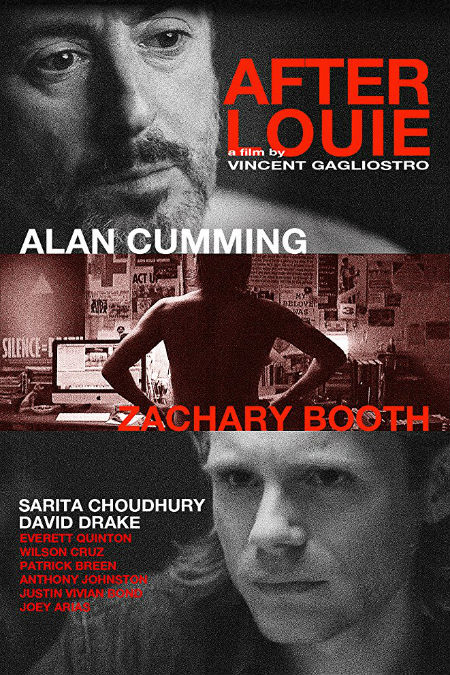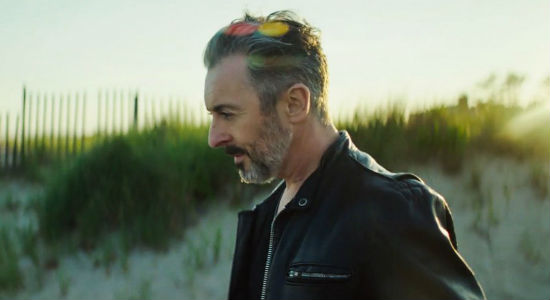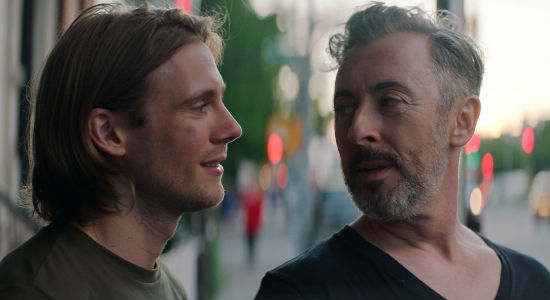
For many people, the past is just that – the past.
An influence, a set of memories, a formative influence on who they are but nothing more than that; creatures of the present, however weighed down by what came before to greater or lesser degrees, they exist now, happy to celebrate the fact that they are here, and not there.
Samuel Cooper (Alan Cumming), a chain-smoking New York artist who appears to have long since abandoned his creative best, despite the pleas of art teacher and dear old friend Julian (Everett Quinton) and gallery owner Rhona (Justin Bond), is a gay man for whom the past is very much alive, or crushingly dead, depending on your perspective.
A member of the generation who fought to wake society to the devastating power of the AIDS epidemic, and a founding member of ACT UP (The AIDS Coalition to Unleash Power), Sam is a man firmly chained to the past, unable, or more likely unwilling, to move into the kind of present his friends from that era Jeffrey (Patrick Breen) and Maggie (Sarita Choudhury) have claimed as their own.
Obsessed with this splicing together video footage of their mutual friend William (David Drake) as he progressed from HIV diagnosis to a harrowing death, one of the multitude that made the ’80s and ’90s such a sorrowful, angering time for many men of Sam’s generation, he is trapped in time, his apartment which he has occupied for 20 years, still looking like it is yet to be unpacked and decorated.
Director and co-writer Vincent Gagliostro (with Anthony Johnston who provides a contemporary perspective), who lived through this harrowing era where funerals and tending to dying friends were ever-present, informs the quietly moving After Louie with a distinct personal tone that resonates clearly, and powerfully at times, in Sam.

He is convinced, like many men of his generation, that the current generation, represented by “accidental prostitute” Braeden Devries (Zachary Booth), a young man he meets one night and mistakes for the latest in a long line of twenty-something sex partners, most just for a night, do not adequately appreciate the sacrifice and pain that people like he, Mags and Jeffrey, and most obviously, William, went through.
Though still replete with discrimination and homophobia – the current Trump era is proof enough of this sadly – theirs is a world where HIV is not a death sentence, where it is possible to dream of getting married (something Sam vehemently disparages in one scene as “heteronormativity!”) and moving to a small house to have kids and dog.
It’s what Braeden’s boyfriend Lukas (Anthony Johnston) wants more than anything, and he watches on helplessly but with growing anger as the love of his life seems to become ensnared physically and emotionally in Sam’s emotionally-stunted and past-scarred life.
After Louie beautifully, and with an entirely fresh perspective, examines what happens when the past, and a vital present that will not be denied despite Sam’s best efforts, collide, and a community, of which I am a part, has to think through what it means to be gay when the old mindset, forged of opposition and ceaseless fighting for basic human rights, is heavily informed by being part of the mainstream.
The battle is from over, as Trump proves once again with his regressive move to ban transgender military personnel and Australia demonstrates with its execrable marriage equality postal survey, but it is far more advanced that it ever was in Sam’s day, something Braeden fruitlessly tries to convince Sam of for much of the film.
The film’s intelligent, mostly well-articulated dilemma is – how you move from a past of confrontation and what was essentially a war for hearts and minds to a more inclusive world which largely accepts that the prejudice and bigotry of the past are relics of a bygone era and adjusts attitudes and legislative imperatives to suit?
It’s a precipitous, sharp point on which to pivot your life, one that Sam, for all his discomfort and eternal sadness and regret – the film is punctuated frequently by footage of Wilson at various points, a reminder that he dominates Sam’s life now just as much as he did then – finds himself powerless to leap from; his friends, though still missing William terribly have done it but Sam remains, lost, adrift and unable to meld a painful past with a more hopeful, progressive present.

While to some extent, leaching some vitality from After Louie, which struggles at times to connect a series of emotionally impacting scenes into a coherent narrative whole and arrives at a soul-cleansing ending seemingly out of nowhere – kudos for avoiding a tacky, treacly road to Damascus moment for Sam but where exactly does his new found appreciation for what’s right in front of him come from? You’re never really sure – Sam’s decades-old existential crisis grants the film much of its quiet emotional resonance.
It acknowledges that emotions are a freakishly powerful thing, that much as we would like to cut ourselves free and unambiguously embrace a vibrant present built on the loss, pain and yes, good times of the past, that doing so is easier said than done.
Cummings bring this torn between ages struggle to vivid, compelling life, his at times tortured, other times sweetly reflective Sam who does have a great stake in the present whether he is willing to acknowledge it or not, an engaging standard bearer for many men of his generation.
It also asks some thoughtful, incisive questions, asking us to consider, particularly those of us in a rapidly-mainstreaming gay community, what and who it is we are when we are no longer fighting to be heard, to be validated but are accepted as human beings equally worth of love and rights as the heterosexual majority?
There are no pat answers or cushy theorems in After Louie; simply, and powerfully, a great deal of reflection and rumination and perhaps, a quiet acceptance, that while things do change and progress to a place we might not even recognise, that they are always built on what came before, and that we should remember we are always creatures in transition, made of the past and present in equal, transformative measure.